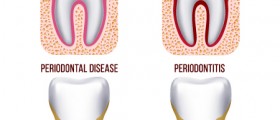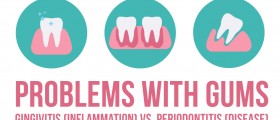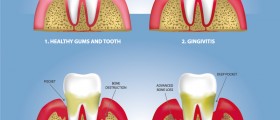
Gum pain often results from injury to the gum area, as well as the onset of diseases like periodontitis and gingivitis. Gum disease can be serious, and the approach to treatment will of course depend on the underlying condition. Much of the time, gum pain will lead to tenderness, inflammation, redness and bad breath, particularly if the cause of pain is gum disease. The majority of the diseases are bacterial, but can also be viral or fungal in nature. Gum disease can eventually result in tooth loss if not treated properly.
Causes
Gingivitis is mild in its manifestation, but can have problematic consequences. Gingivitis is caused by food particles or plaque accumulating in the gap between tooth and gum. This makes for ideal conditions with regard to bacterial growth. Periodontitis attacks the bone that supports the teeth, as well as the gum itself. Eventually, periodontitis might cause tooth loss as a result of wear and tear on the deeper gum tissues.
Gum pain can be caused by injury or trauma, as already indicated. It can also occur as a result of heavy brushing or the consumption of hard edged foods. This type of injury can be a major cause of gum pain. Physical injuries can also lead to the development of canker sores.
If a wisdom tooth is developing, it may also lead to gum pain. Developing wisdom teeth can also cause pain in the inner cheek area. Another potential cause of gum pain is tooth decay and tooth abscess. Vitamin deficiency might also lead to gum pain.Treatment
Gum pain that is caused by minor burn or injury is normally easily resolved. A saline water mouthwash might help relieve pain of this type. Rinse your mouth several times a day with the solution. You can also apply ice to the affected area.
If you mix baking soda with water, you can make a thick paste that, when applied to the gum, will provide pain relief. Baking soda will put a halt to bacterial growth in the mouth. Another possible home remedy involves the use of tea tree oil or clove oil. The latter is a well known remedy for oral conditions.
Should the natural remedies fail, medical treatment might be required. One might be prescribed analgesics or anti-inflammatory medication. Further treatment will depend on the underlying cause. The best way to avoid gum pain, however, is to maintain proper dental and oral hygiene.







_f_280x120.jpg)









Your thoughts on this
Loading...